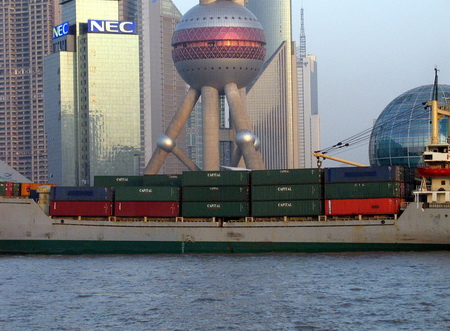Top Biz News
Shanghai to get container derivatives mart
(China Daily)
Updated: 2010-02-26 10:51
 |
Large Medium Small |
SHANGHAI: Shanghai Shipping Exchange, based in China's busiest port, intends to set up a container-shipping derivatives market by year-end as the city tries to challenge London as a global center for shipping finance.
The forward freight agreements, or FFAs, which help guard against fluctuations in shipping rates, will be targeted at small- and medium-sized exporters, who don't have the volumes needed for long-term shipping contracts, said Yao Weifu, a director at the shipping exchange. The plan is awaiting government approval.
Morgan Stanley last month backed the first FFA tied to a Shanghai container index, as the shipping exchange attempts to persuade the sector to adopt futures. Unlike in the dry-bulk and tanker segments, container-shipping has rarely used FFAs because the wide variety of cargos and customers using each ship makes it more difficult to accurately track rates, said Jay Ryu, an analyst at Mirae Asset Securities Co in Hong Kong.
 |
|
A container ship docked in Shanghai. The new forward freight agreements, or FFAs, will be targeted at small- and medium-sized exporters, according to the shipping exchange. [China Daily] |
"There is some need for hedging because rates recently have been very volatile," said Ryu. "Still, the trading volume will not be as huge as for dry bulk or tankers."
Clarkson Plc, which led the development of FFAs in 1991, helped devise the four-month-old Shanghai Containerized Freight Index to act as a benchmark for container-shipping futures.
The securities arm of the world's largest shipbroker also organized the container FFA between Morgan Stanley and shipping line Delphis NV. The trial deal covered a total of 10 cargo boxes to be shipped this month and next, according to the Shanghai Shipping Exchange's official magazine.
"The first trade has shown that the index is acceptable to global markets and that it can be used for futures," said Yao. "Now it's time to move on and launch derivatives in Shanghai."
Futures index
The weekly Shanghai Containerized Freight Index tracks spot rates for shipments on 15 routes, including to Europe, the Mediterranean and the US. The data, compiled from 15 shipping lines and 15 freight forwarders, reflects more than 60 percent of global container-shipping, Yao said. The index rose 19.01 points to 1396.21 on Feb 12.
The exchange will partner with a settlement bank and an electric-trading systems provider to set up the futures trading platform, Yao said.
| ||||
The Baltic Dry Index, the benchmark index for commodity-shipping costs doubled in 2007, slumped 92 percent in 2008 and then tripled last year as trading exacerbated fluctuations in rates caused by shipping supply and demand.
Dry-bulk FFAs are settled against the Baltic Dry Index and other indexes run by the London-based Baltic Exchange, which traces its history back to 1744.
"The Baltic Exchange has always been about tramp shipping, so a container index is not a natural target for us," said Jeremy Penn, the exchange's chief executive officer. Tramp shipping refers to vessels that haul tendered cargoes to different ports rather than operating to a published schedule.
The Baltic Exchange, whose tanker indices are also used for FFAs, is considering a proposal from the London Metal Exchange to jointly set up a new FFA exchange.
Bloomberg News












